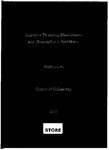Intrusive Thoughts, Mindfulness and Dissociation in Self-Harm
| dc.contributor.supervisor | May, Jon | |
| dc.contributor.author | Batey, Helen Elizabeth | |
| dc.contributor.other | Faculty of Science and Engineering | en_US |
| dc.date.accessioned | 2011-06-14T10:07:27Z | |
| dc.date.available | 2011-06-14T10:07:27Z | |
| dc.date.issued | 2011 | |
| dc.date.issued | 2011 | |
| dc.identifier | 10200648 | en_US |
| dc.identifier.uri | http://hdl.handle.net/10026.1/484 | |
| dc.description.abstract |
This thesis presents four studies that examine the potential role that intrusive thoughts, dissociation and mindfulness in self-harming behaviours in young people and adults. A large online study was conducted with students and staff at a UK university. This examined a range of risk factors for self-harm derived from the literature, including dissociation, family background/trauma history and intrusive thoughts. This study was followed up with a qualitative study investigating triggers of self-harm, and the role of intrusive thoughts. A third study then looked at these factors in young people who were inpatients in an American psychiatric hospital, and who had all expressed intent to self- harm or commit suicide. This study also introduced a measure of trait mindfulness in order to investigate this potential way of dealing with intrusive thoughts. Finally, the risk factors identified in these studies were further investigated with an online survey with undergraduate students at a second UK university, dissociation, mindfulness and thought suppression. Intrusive thoughts were found to differ in content, frequency and effect between people with experience of self-harm and those without. A subgroup of potentially maladaptive behaviours were found to be associated with high scores on the predictors of self-harm, and therefore potentially predictive of self-harm. In the young people in hospital, the extent to which they reacted to their intrusive thoughts was inversely associated with the extent to which they were naturally mindful. Trait mindfulness scores were lower for those individuals with a history of childhood trauma, and for those meeting diagnostic criteria for Borderline Personality Disorder, in which self-harm is a key feature. These findings together suggest that mindfulness skills may play an important role in both dealing with intrusive thoughts and for protecting against self-harm. Overall, intrusive thoughts and dissociation were associated with experience of self- harming behaviours, while mindfulness skills were negatively associated with self-harm. Some potentially maladaptive behaviours (including smoking and eating pathology) represent risk factors for self-harm, and therefore may provide professionals with a way of identifying people for early intervention, if further longitudinal research shows evidence of progression. Alternatively, the differences in mindfulness between this group and the self-harmers may indicate that mindfulness training could benefit people who self-harm. | en_US |
| dc.language.iso | en | en_US |
| dc.publisher | University of Plymouth | en_US |
| dc.subject | Self-harm | en_US |
| dc.subject | Mindfulness | en_US |
| dc.subject | Risk factors for self-harm | en_US |
| dc.subject | Intrusive thoughts | en_US |
| dc.subject | Dissociation | en_US |
| dc.title | Intrusive Thoughts, Mindfulness and Dissociation in Self-Harm | en_US |
| dc.type | Thesis | |
| dc.identifier.doi | http://dx.doi.org/10.24382/4243 |
Files in this item
This item appears in the following Collection(s)
-
01 Research Theses Main Collection
Research Theses Main


